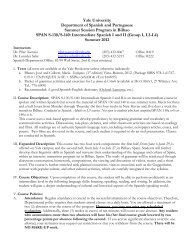Yale Summer Session and Yale University
Yale Summer Session and Yale University
Yale Summer Session and Yale University
You also want an ePaper? Increase the reach of your titles
YUMPU automatically turns print PDFs into web optimized ePapers that Google loves.
<strong>Yale</strong> <strong>Summer</strong> <strong>Session</strong> 2012 <strong>Summer</strong> Faculty H<strong>and</strong>book<br />
If you must do last minute photocopying <strong>and</strong> cannot do so at your department or at<br />
Docuprint, please be sure to keep your receipt(s) so that <strong>Summer</strong> <strong>Session</strong> can<br />
reimburse you. It is preferable, however, to use Docuprint or your department.<br />
7. Class size, minimums <strong>and</strong> maximums<br />
Classes during the summer tend to be much smaller than during the academic year.<br />
Average seminar size is 11 or 12 students. Instructor appointments are conditional on<br />
the course attaining a minimum enrollment of 5 students. Instructors will be notified<br />
no later than two weeks before their class is scheduled to begin if a course has fewer<br />
than 5 students enrolled. Those courses that have five students two weeks before the<br />
start of the course will be conducted, even if enrollment falls below five at some point<br />
subsequent to this.<br />
While YSS does not normally impose a cap on seminar sizes, there may be certain<br />
exceptions. If you have a concern with the maximum number of students in your<br />
course, based on equipment needs or other restrictions, please let the director know<br />
before the course description is published. All caps must be included in your course<br />
description.<br />
Please note that minimum <strong>and</strong> maximum number of students per course will be<br />
different for courses taught wholly or in part abroad. Please refer to the Faculty<br />
H<strong>and</strong>book for Study Abroad for more information<br />
8. Field trips<br />
Academic field trips can be an important—<strong>and</strong> enjoyable—element of education. They<br />
often significantly enhance the content of a course by providing a type of information<br />
hard to convey in the classroom. We define an academic field trip as a course-related<br />
activity that serves educational purposes <strong>and</strong> occurs outside of the classroom at a<br />
location other than on the campus at which the course is regularly taught. Academic<br />
field trips are, by definition, university-sponsored events <strong>and</strong> must conform to specific<br />
guidelines as outlined in the <strong>Yale</strong> College policy on field trips here:<br />
http://yalecollege.yale.edu/content/academic-field-trip-policies<br />
YSS instructors who plan to include an academic field trip should adhere to the<br />
following guidelines.<br />
a. All required academic field trips must be clearly identified as such in the course<br />
syllabus at the beginning of the term, with detailed information about date,<br />
time, locations, means of transportation, <strong>and</strong> any fees for which the student is<br />
responsible.<br />
b. In the first class of the session, the faculty member must discuss with students<br />
in appropriate detail any risks associated with the activity of the field trip,<br />
relevant emergency preparedness information at http//:www.yale.edu, <strong>and</strong><br />
13



